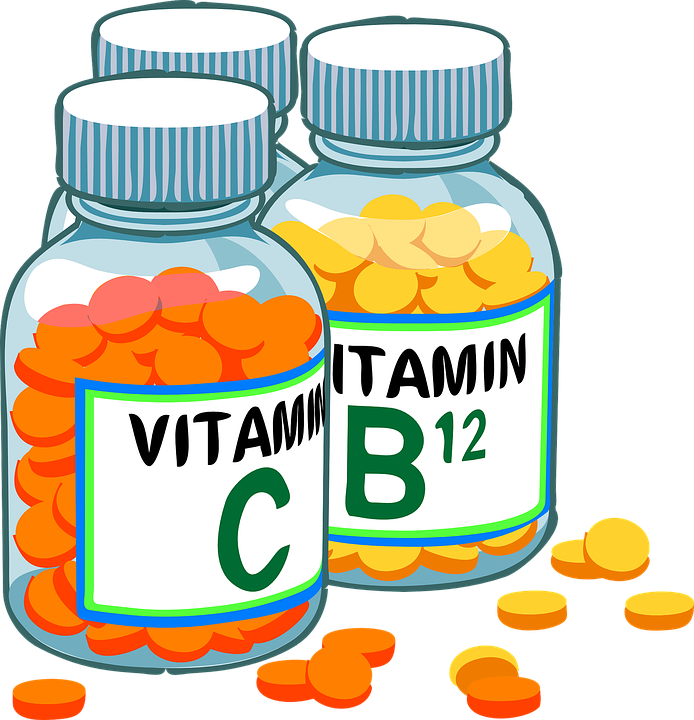Disclosure: This article may contain affiliate links. If you decide to make a purchase, I may make a small commission at no extra cost to you.
Vitamin B12 plays a very important role in our health and well-being. It’s not often that you hear about someone developing a vitamin B12 deficiency or developing hair loss from it, but it does happen more than you might think. Fortunately, hair loss from a B12 deficiency appears to be reversible.
Certain groups of people will be more prone to developing hair loss related to B12 deficiency than others.
In this article, I’ll clear up a few things for you!
- What is Vitamin B12 and why it’s important our your health and your hair
- How to determine if you are at risk of developing vitamin B12
- How you can ensure that you are getting enough vitamin B12
- What tests you can get done to test your B12 levels accurately
- Which supplements B12 supplement is best to treat hair loss
- How long does it take to reverse hair loss
Vitamin B12 and Hair loss – What’s the connection?
Vitamin B12 is absolutely crucial and you cannot live without it. It is part of the B-complex vitamins and plays many important roles in proper cell function and the human body overall. Since I’m a vegan, I always make sure that I take a Vitamin B12 supplement.
Here are just a few reasons why Vitamin B12 is important
- It helps create new red blood cells that supply oxygen to every part of your body, including your hair!
- It allows nerves to function correctly and is an important co-factor in myelin formation which protects the nerves.
- It plays a critical role in creating DNA, which is the genetic material that is used to create proteins of which the body is made up of.
- It plays an important role in energy metabolism by allowing the body to produce energy from fats and proteins.
What are the main symptoms of a B12 deficiency?
- Anemia
- Low energy (intense fatigue)
- Easy short of breath
- Poor vision
- Chronic depression
- Low appetite
- Memory loss
- Skin lesion and hyperpigmentation
- Difficulty walking
- Insomnia
- Nerve tingling and burning from neuropathy
- Hair loss
There are only just a few of the symptoms which can arise as you become critically low in vitamin B12 stores.
If caught in time, the majority of symptoms are reversible, however, once it starts damaging your nerves, it can be permanent if not reversed in time.
Why B12 deficiency causes hair loss
As you can tell, vitamin B12 affects the whole body, and therefore obviously would have disastrous effects on hair growth as well.
Vitamin B12 causes anemia, which by itself is a reason for hair loss. Lack of oxygen to the hair follicles puts them under severe stress and the hair starts to shed.
The other reason why Vitamin B12 deficiency can cause hair loss is that B12 is critical in the DNA replication process. If proper and rapid cell division cannot take place due to a deficiency, then your hair will not grow as fast and will fall out. Eventually, there will be more hair loss than grown, and this will lead to diffused hair loss all over.
And finally, B12 is important in creating energy derived from fats and protein in the diet. Energy metabolism is what drives all processes in the body.
Who is at most risk of a B12 deficiency?
There have been a few groups of people that have been identified to be at greater risk of developing a deficiency of Vitamin B12.
- Vegans and Vegetarians
- Low income-populations with poor diets
- Elderly persons over 50
- Pregnant women
- People who have stomach issues such as celiac disease, Crohn’s disease, atrophic gastritis, and gastric bypass surgery
- People who take medications, including aspirin, proton pump inhibitors, metformin, etc
- Excessive alcohol intake
- Pernicious anemia
In otherwise healthy persons, people who adhere to strict diets like vegetarians and vegans are at high risk of developing B12 deficiency and hair loss from it, due to the low amount or almost absent amount of B12 in plant foods.
Studies have shown that 62% of pregnant women, 25-86% of children, 21-41% of adolescents, and 11-90% of elderly are at risk of B12 deficiency
Vegetarians or vegans who had adhered to the diet since early in life were more likely to be deficient than those who had adopted the lifestyle at a later point in their life. (study)
Where can you get B12 from?
First of all, let’s look at how much B12 you need to obtain from your diet in order to stay healthy!
- 0-6 months – 0.4 mcg
- 7-12 months – 0.5 mcg
- 1-3 years old – 0.9 mcg
- 4-8 years old – 1.2 mcg
- 9-13 years old – 1.8 mcg
- 14-18 years old – 2.4 mcg
- Adults – 2.4 mcg
- Pregnant women – 2.6 mcg
- Breastfeeding women – 2.8 mcg
As you can see, it doesn’t look like you need to get a lot of B12 from your diet. You only need a very small amount, and that’s why it might be surprised why some people are at risk of developing a deficiency. But studies show that it does happen quite often.
Best foods sources of B12
Many foods have been fortified with varying levels of B12. Cereals are one commonly consumed food and are more often than not fortified with several B vitamins, including B12. Otherwise, below are a few sources of B12:
- Beef liver and claims provide high amounts of B12
- Meats such as chicken, beef, fish all contain B12
- Eggs and Milk are good sources of B12
Notably absent from that small list is plant foods. Unfortunately, we cannot get anywhere near enough B12 from plant foods, and therefore if you are vegetarian or vegan, it is crucial to supplement vitamins.
B12 Deficiency Tests
The standard vitamin B12 can be done at your doctor’s office and takes just a few seconds to draw enough blood for accurate measurements.
Your doctor may also include other tests with is like a complete blood count to measure how many certain types of red blood cells you have.
Interpreting your test results
Vitamin B12 is often measured in picograms per ML (pg/mL).
Below 150 is low and deficiency
Between 200 – 600 is normal
Above 800 is high
It’s worth noting that different countries and labs have different interpretations of what constitutes a normal level. If you have anything below 300, I would highly recommend you supplement and investigate further.
The other test you can do, which can be more accurate in determining B12 status is called an MMA test. Speak to your doctor about this urine test if you are still concerned about B12 deficiency.
Supplementing B12
One of the easiest ways to manage hair loss from a B12 deficiency is to simply take supplements.
We know that taking B12 is extremely safe to take even in relatively high amounts.
Four types of b12
- Cyanocobalamin – This is a form of B12 which is not found in food but is synthesized in the lab and the form of B12 which is most often consumed in supplement form.
- Hydroxocobalamin – This is a form of B12 which is found in food and produced by bacteria. Often used in the form of injections, where the body then converts it into methylcobalamin.
- Adenosylcobalamin – An unstable form of B12 which is much less frequently used than cyanocobalamin.
- Methylcobalamin – This form of B12 is the most easily utilized and bioavailable to the human body. You can also buy sublingual methylcobalamin supplements which will bypass the stomach and be absorbed straight into the bloodstream under the tongue.
How long will it take to reverse hair loss from a deficiency?
Depending on how long the deficiency has been going on for and what damage has been caused, it might take at least 4 months before you start seeing significant recovery from your symptoms.
The resting phase of hair follicles also can last anywhere between 3-4 months. And the hair that you currently have on your head right now may even fall out at some point, as the new stronger hair starts growing back in.
The whole process, therefore, may take 6 months or even a year or more before hair loss is significantly improved. See how much hair growth you can expect over 6 months here.
Recovering from hair loss due to a B12 deficiency will require a lot of patience. However, rest assured, hair loss is completely reversible as long as you current the deficiency and maintain adequate B12 levels.







2 Comments
Henry Bouville
July 23, 2018 at 3:15 pmHi,
Great post. Is it possible to recover hair lost at the hairline if it’s caused by a b12 deficiency? I think it may have activate male pattern baldness, is it possible to recover hair lost from this or not?
Thanks,
Henry
Matt
September 19, 2018 at 3:12 amIf hair loss is clearly due to a vitamin B12 deficiency, you should be able to reverse it. If the problem is caused by androgens (primarily DHT), then a B12 deficiency will likely just exacerbate the problem rather than be a trigger.
When DHT is already attacking the hair follicle and is in a weakened state, having nutrient deficiencies is just going to speed up the process of male pattern baldness, not necessarily trigger it.